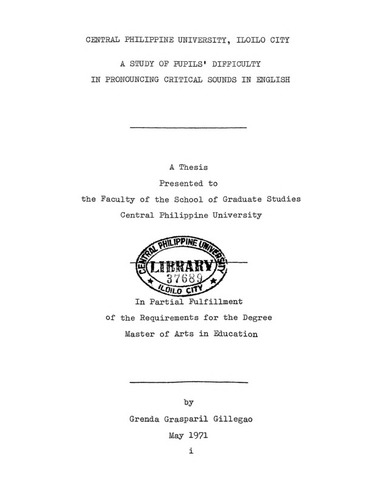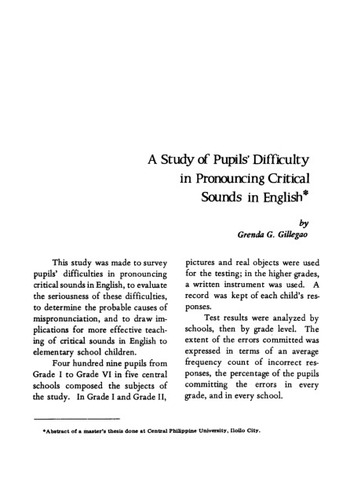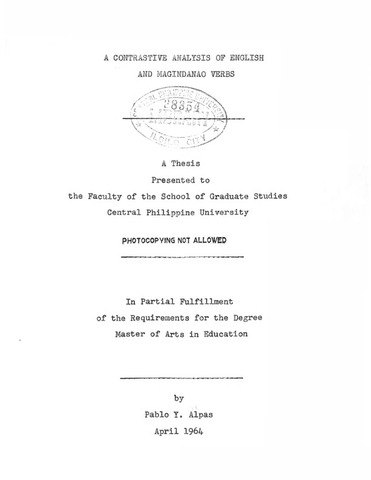| dc.contributor.adviser | Griño, Eliza U. | |
| dc.contributor.adviser | Ruiz, Macario B. | |
| dc.contributor.author | Arandela, Josefina M. | |
| dc.date.accessioned | 2021-06-09T02:35:34Z | |
| dc.date.available | 2021-06-09T02:35:34Z | |
| dc.date.issued | 1972 | |
| dc.identifier.citation | Arandela, J. M. (1972). Oral reading difficulties and the factors related to these difficulties (Unpublished Master's thesis). Central Philippine University, Jaro, Iloilo City. | en_US |
| dc.identifier.uri | https://hdl.handle.net/20.500.12852/994 | |
| dc.description | Abstract only | en_US |
| dc.description.abstract | This study aimed to find out the oral reading difficulties of poor readers from Grado III to Grade V and to discover the factors that may be related to these difficulties. This study was conducted at the Central Philippine University Elementary School. Seventy pupils were involved in the study, one half of whom were poor readers and the other half, good readers. The "poor readers" were those whose reading grades were 79% or lower; "good readers" had reading grades of 85% or better. Sixty-three per cent of the total number, or forty-four pupils, came from the laboratory classes and thirty-seven per cent, or twenty-six pupils, came from the "parallel” classes or non-laboratory group. "Laboratory classes" here means classes which serve as laboratory for observation and participation students, practice teachers, and interns in the College of Education. Of the thirty-five poor readers, fifteen came from Grade III, fifteen from Grade IV, and five from Grade V. The same distribution was obtained in the good readers' group. The xv children's ages ranged from ten to fourteen years, and the average age was eleven years. Forty-three per cent of the whole group, or thirty children were transferees from other schools and the rest were indigenous.
The following wore the questions which this study sought to answer:
1. What are the common oral reading difficulties of the children? Which of these are also persistent?
2. Is the child's physical health associated with his reading performance?
3. Is authoritarianism on the part of the parents related to the child's reading performance?
4. Is the family's socio-economic status related to the child's reading performance?
5. Is mental ability associated with reading performance?
6. Is attendance in school related to reading performance?
PROCEDURE USED
1. Oral reading tests were administered to both the good readers and the poor readers. The first one was with the use of graded reading materials; the second, with the use of a common reading material especially meant for Grade III. Each subject was asked to read one selection twice and the errors he committed at each reading were recorded in separate sheets. For comparison, only the record for the second reading was used. The reading of the children was all tape-recorded in order to insure reliability of the analysis.
2. A mental ability test was administered to the children under study. Their scores in this test were associated with their reading performance.
3. Two questionnaires were sent to the parents of the children and their results were analyzed:
a) All the parents of the children were asked to answer a questionnaire on socio-economic status. The relationship between the scores obtained and the pupils' reading performance was determined.
b) The scores obtained from a questionnaire on parents' authoritarianism and the pupils’ reading performance were also studied for relatedness.
4. Teachers' records were looked into for data on each child's attendance in school. The relationship between these and reading performance was determined.
5. The children's physical examination records at the Iloilo Mission Hospital was interpreted by the University physician. Association studies were made between these and the children's reading performance.
FINDINGS
The study revealed that the most common oral reading difficulties of the children were poor pronunciation and insertion or omission. Furthermore, physical health and parents' authoritarianism were the only factors among those studied, which were relevant to general reading performance.
Socio-economic status, as a whole, is not highly associated with general reading performance. The more meaningful associations are between specific indexes and specific reading skills: parents' educational level is highly associated with pupils' ability to pronounce words; visual aids in the home is highly associated with the pupils' ability to sight-read.
On the basis of the findings, the following recommendations are made:
1. Male student teachers should be made to undergo practice teaching in reading.
2. There should be a developmental reading program in every school under a full-time developmental reading teacher.
3. There should be closer cooperation and coordination between parents and teachers so that they could work out the implications of the relation between such factors as physical health and parents authoritarianism, and the xviii children’s reading performance.
The following problems have been suggested for further study:
1. The possibility of establishing a developmental reading program for the elementary grades.
2. The teacher’s influence on the learning of reading.
3. The comparative effectiveness of any two methods of teaching reading. | en_US |
| dc.format.extent | xviii, 135 leaves | en_US |
| dc.language.iso | en | en_US |
| dc.subject.ddc | GSL Theses 378.242 Ar137 | en_US |
| dc.subject.lcsh | Reading (Elementary) | en_US |
| dc.subject.lcsh | Reading | en_US |
| dc.subject.lcsh | English language | en_US |
| dc.subject.lcsh | English language--Study and teaching | en_US |
| dc.subject.lcsh | English language--Study and teaching (Elementary) | en_US |
| dc.subject.lcsh | English language--Pronunciation | en_US |
| dc.subject.lcsh | English language--Pronunciation by foreign speakers | en_US |
| dc.subject.lcsh | Central Philippine University | en_US |
| dc.subject.lcsh | Central Philippine University--Students | en_US |
| dc.subject.lcsh | School children | en_US |
| dc.subject.lcsh | Students | en_US |
| dc.title | Oral reading difficulties and the factors related to these difficulties | en_US |
| dc.type | Thesis | en_US |
| dc.description.bibliographicalreferences | Includes bibliographical references | en_US |
| dc.contributor.chair | Herradura, Elma S. | |
| dc.contributor.committeemember | Alba, Leda G. | |
| dc.contributor.committeemember | Porter, Josefina Y. | |
| dc.contributor.committeemember | Espada, Wilfredo G. | |
| dc.contributor.committeemember | Ruiz, Macario B | |
| dc.contributor.committeemember | Griño, Eliza U. | |
| dc.contributor.department | School of Graduate Studies | en_US |
| dc.description.degree | Master of Arts in Education | en_US |
| local.subject | Central Philippine University (CPU). Elementary School. | en_US |
| local.relation.associatedcontent | https://repository.cpu.edu.ph/handle/20.500.12852/2074 Journal article published in Southeast Asia Journal | en |





